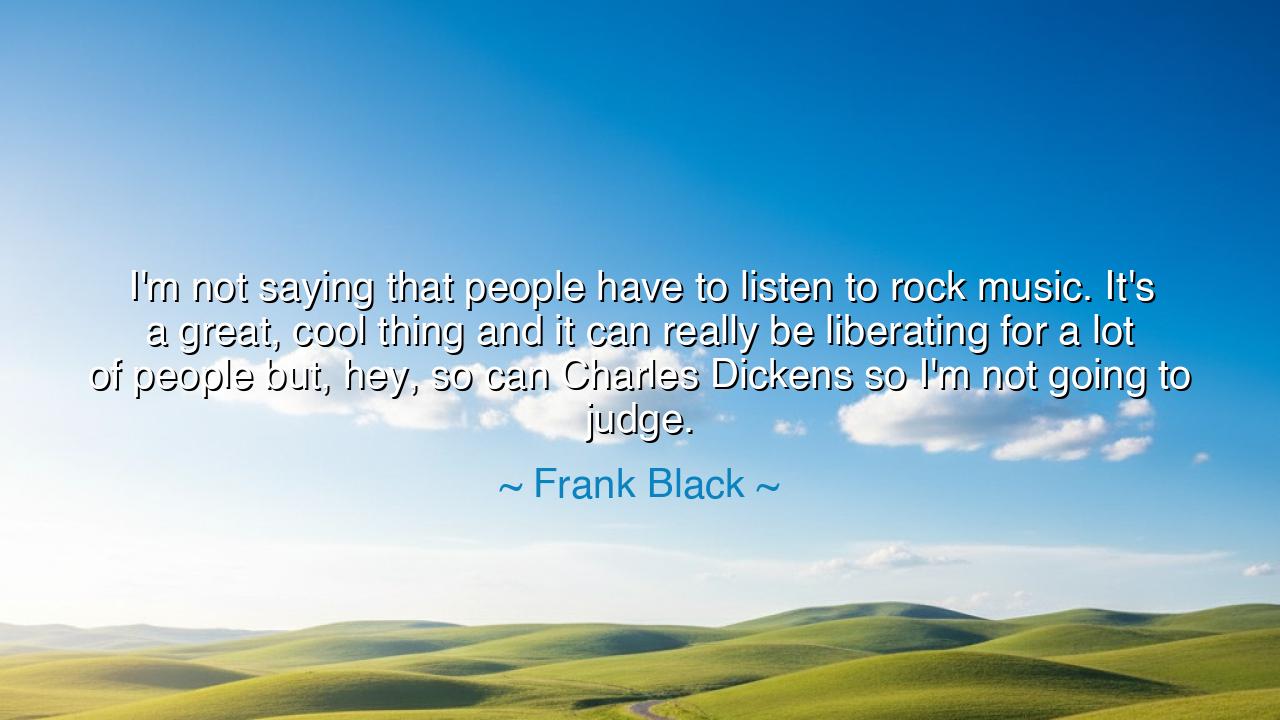
I'm not saying that people have to listen to rock music. It's a
I'm not saying that people have to listen to rock music. It's a great, cool thing and it can really be liberating for a lot of people but, hey, so can Charles Dickens so I'm not going to judge.






"I'm not saying that people have to listen to rock music. It's a great, cool thing and it can really be liberating for a lot of people but, hey, so can Charles Dickens so I'm not going to judge." These words, spoken by Frank Black, carry within them the essence of personal freedom and the understanding that the paths to liberation and enlightenment are as diverse as humanity itself. Black’s message is one of inclusivity and tolerance, reminding us that no single art form or medium holds a monopoly on meaning or fulfillment. Whether it is the raw energy of rock music or the timeless wisdom of a literary genius like Charles Dickens, each has the power to uplift, inspire, and liberate, depending on the individual’s personal connection to it.
In the ancient world, this principle was understood by those who recognized the vastness of the human spirit and its varied ways of seeking truth and understanding. The great Greek philosophers, such as Socrates, Plato, and Aristotle, explored different pathways to knowledge and virtue, knowing that each soul was unique in its pursuit of wisdom. Socrates, in his method of dialectic, did not claim to have all the answers but sought to help others find their own truths through questioning and dialogue. Just as Socrates did not impose one philosophy on his students, Black’s words remind us that there is no single, universal path to liberation. Whether through music, literature, or other forms of expression, the key lies in what resonates deeply with the individual.
This philosophy of personal choice and individuality is reflected throughout history, where people have sought freedom through various means. Consider the Renaissance, a time when art, science, and philosophy flourished across many disciplines. Leonardo da Vinci, Michelangelo, and Galileo were not bound to one medium of expression or understanding. They embraced the idea that to liberate the human mind, one must explore multiple avenues—art and science, spirituality and philosophy. Just as da Vinci expressed his genius through both painting and engineering, we too can find liberation in diverse forms, from the electric rhythm of rock music to the thought-provoking words of Dickens.
The power of rock music, as Black mentions, has been felt by many throughout history as a force for freedom. The Beatles, with their revolutionary sound, gave voice to an entire generation that felt alienated from the mainstream. The punk rock movement, with its raw and defiant energy, became a vehicle for those who sought to break free from societal norms. For some, the raging chords of rock were a form of expression that gave them a voice, a means to fight against the oppression of their time. Black acknowledges this in his words—he does not judge those who find liberation in music. In the same way, Dickens’ works, rich with social commentary and human insight, have helped countless individuals reflect on their lives, their societies, and their moral responsibilities.
The beauty of Black’s perspective is that it invites us to explore and embrace what speaks to us personally, without the burden of judgment. It echoes the ancient wisdom of diversity in learning and self-expression. The ancients did not demand that all men follow the same path, for they understood that individuals find their own meaning in different ways. This is why Heraclitus said, "Character is destiny." Our character shapes how we connect to the world, and for some, the rhythm of rock music or the literary genius of Dickens might offer the clarity they seek. The lesson here is profound: true liberation comes from allowing ourselves to explore and embrace what gives us meaning and purpose.
The lesson in Black’s quote is about respecting individual journeys and recognizing that each person’s path to freedom and growth is unique. It teaches us not to impose our beliefs or preferences onto others, but to allow them the space to find their own way. The future lies in our ability to understand the multiplicity of human experiences and to honor the diverse ways people express themselves and find meaning. Whether in rock music, literature, or any other form of art or expression, the truth is not in what we do, but in how we connect with it, how we use it to express our humanity and how it helps us grow.
In our own lives, we must be open to embracing diversity in thought, action, and expression. We must avoid the temptation to judge others for their tastes or ways of thinking, for each individual is on a personal journey—one that is shaped by their own experiences, interests, and reflections. Let us celebrate what makes us different, recognizing that the true beauty of human life lies in this diversity. The next time we encounter something unfamiliar or contrary to our own experiences, let us not judge, but rather seek to understand and appreciate the freedom it provides to someone else. And in doing so, we will enrich our own lives, embracing the boundless ways in which people seek truth, freedom, and expression.






AAdministratorAdministrator
Welcome, honored guests. Please leave a comment, we will respond soon